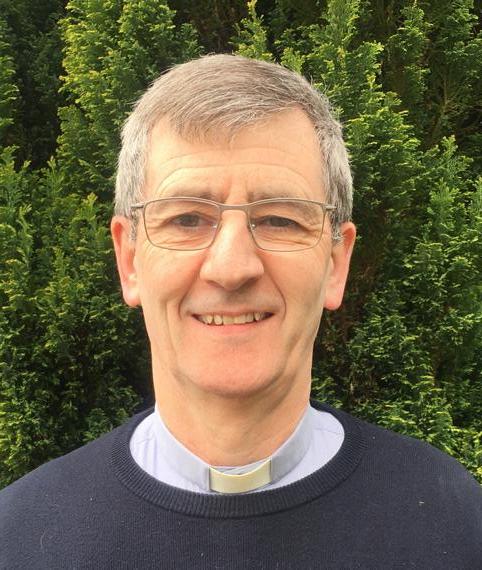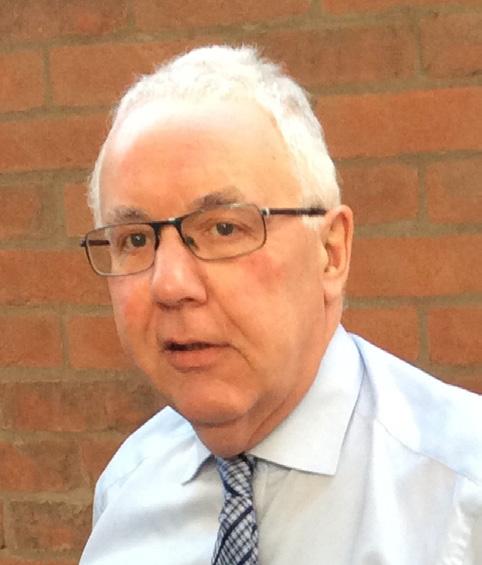
6 minute read
Chaplaincy amidst Covid
Chaplaincy
amidst Covid
Suzanne Hamilton looks at how the work of hospital chaplains has changed during the pandemic.
Over the past year the healthcare system across Ireland, both north and south, has been under immense pressure due to the coronavirus pandemic.
Quite rightly, there has been much media and political focus on the immense pressures endured by doctors and nurses, but perhaps less has been said about others in the healthcare system who have steadfastly carried out their duties in these unprecedented times – the porters, care assistants, kitchen staff and hospital chaplains.
Presbyterian chaplains serve in hospital settings throughout Ireland, from County Londonderry’s Altnagelvin Hospital in the north to Cork University Hospital in the south. All have seen their ministry change as the world adapts to the challenges of Covid-19.
“Don and doff” is how Rev Ken Doherty describes his new routine at Belfast’s Mater Hospital. Pre-Covid, chaplains were only armed with Bibles as they made their visiting rounds. Now it is a case of putting on a whole range of Personal Protective Equipment (PPE) such as aprons, gloves, hairnets, face coverings and visors. “These days it’s don and doff all the PPE stuff… All of that takes time. Each visit takes longer as in most cases we have to change between visits,” he says.
Rev Mark Proctor, a part-time chaplain in Tallaght Hospital, agrees, saying that previously PPE would only be required for certain patients, but has become increasingly necessary due to Covid. “It’s kind of weird, it’s business as normal but with extra precautions in place.”
A year down the line, Mr Proctor says he has settled into the new routine. “I think in the beginning it was more unsettling because we didn’t know what the dangers were… in one place there were very little precautions, but in the next ward they were wearing space suits – it was inconsistent. Definitely things have settled down and we know what we’re meant to do and what to wear. It’s just being careful.”
Donning PPE isn’t the only new routine the chaplains have had to adjust to. Visiting is also different due to restrictions introduced. “Previously I was just visiting anybody, at any time in any ward, day or night. Now it’s very much targeted visitation,” explains Mr Doherty. Visits from family members have also been scaled back, which means that interactions with the chaplains have an added importance. “Visits are very much appreciated, now even more so,” he says.
Ironically, while each visit takes longer due to the new precautions, the time spent with each patient is shorter. During these calls, Mr Doherty explains that many patients need reassurance. “Some are quite terrified…not for themselves, it’s for their families. Yesterday I called in with one man and his big concern was his wife and his family. He was recovering from Covid.”


Worryingly, Mr Doherty has found and says, “Ministry is taking place for the the numbers on his visiting lists have actual NHS staff.” dropped, and he suspects it is because This ministry is particularly important patients are not being asking what faith considering the pressure staff in all roles group they belong to on admittance. work. This is the case for Rev David are facing. Mr Doherty says it has been Stating that “numbers have dived Cupples who is chaplain in South West traumatic for them, but they’re doing dramatically over the past year,” he is Acute Hospital in Enniskillen. their duty as best they can. “I’m blown appealing for ministers to let chaplains “Regulations are changing all the time. away by the care and consideration of just know if one of their congregation is There were periods where I could have everybody really, whether doctors, nurses, admitted to hospital. gone into certain wards and not others. porters, cleaners… they all look after each
In the Republic, visiting for families I could have gone in some cases in full other.” stopped in March 2020 apart from a few PPE or sometimes that wasn’t required. Mr Proctor says he’s always been in occasions such as end of life or children Even at the moment, the situation is contact with staff, and is sure this will in hospital. This means that those that if someone is very seriously ill and I continue after Covid. “Different staff patients who need the are expected opportunity to get better to chat will have about their no visitors experience during and their their stay. own fears. Many keep I’m there for in contact staff and the through patients,” he video chat, says. but for older Like the people who David Cupples health staff can’t work they serve technology, having the chaplain call is phone the ward, I might get a different with, chaplains are putting themselves in important. “They don’t want to let you response from different wards,” he danger. Mr Doherty caught the virus at go,” says Mr Proctor. explains. the beginning of the pandemic and was
At the start of the pandemic, there were Fortunately, he can still access patient out of action for a month. Some of Mr attempts to introduce virtual chaplaincy, lists so he can let local ministers know if Proctor’s chaplaincy team colleagues also explains Mr Proctor, adding, “It never one of their congregation is in hospital, contracted Covid, but all have recovered really took off. It’s not the same as having but he says, “It’s frustrating for other and are back to work. Both play down the somebody with you.” ministers too. Some think because I’m a risks, with Mr Proctor pointing to forces
He adds, “It’s good to be here to be hospital chaplain I can get in and visit on chaplains who are on the frontline with able to minister to patients, to talk with their behalf, but that’s not really the case.” their regiments, and Mr Doherty saying, them and pray with them, and read Mr Cupples has used technology to “We just do our duty.” Scripture. We can’t carry anything onto minister to the ill, with Rev Robert Bell, the wards so it’s all in the memory bank... nurses bringing mobile convener of PCI’s It’s amazing how appropriate the words phones to their bedside. Healthcare, Prisons of the Aaronic blessing are to share with He says this isn’t ideal and Forces Chaplaincy someone who is struggling. though. “In hospital, Committee, recognises
“I’ve met patients and simple words especially with the very the important and of Scripture have had them in floods of elderly people, I have to difficult work carried out tears, as these are God’s words to them in speak up. I might normally by the chaplains. He has their struggles.” want to sit very close to spoken to many on the
He says, particularly for those with them or I might want to phone and says they are an existing faith, it is a comfort to hold their hand. All sorts doing a wonderful job know God is with them, and adds, “For of things are not possible… trying to compensate for those patients who have a relationship It’s like Zoom meetings – congregational ministers with God, there are more meaningful it’s great to have them, but who can’t see their members. opportunities for ministry.” they’re very much second best.” “I really do stand back in admiration
Like the incidence of Covid-19, the Of course, chaplains do not just for the work that they have been doing,” picture across Ireland is not the same. minister to the ill, but also to the staff. he says. While some chaplains have been on the Mr Cupples is thankful that he had the frontline throughout, others have found opportunity to lead prayers at a day of regulations have greatly restricted their thanks held for hospital workers last June,
Mark Proctor Ken Doherty
Robert Bell Suzanne Hamilton is an administrative officer for the Herald.












